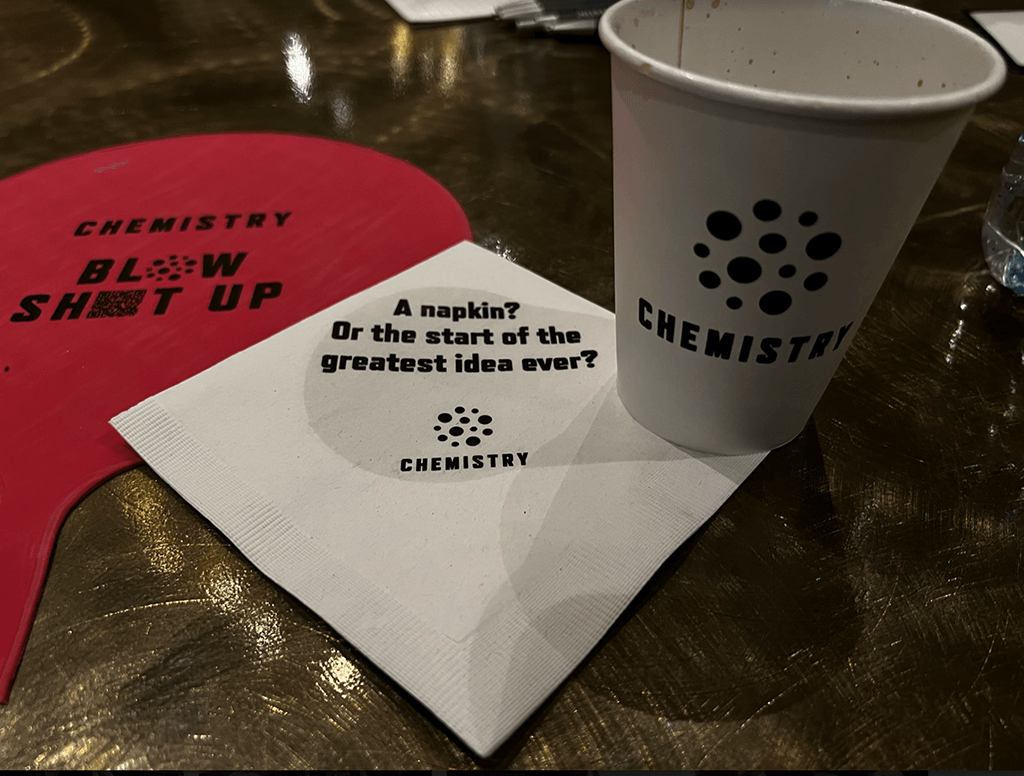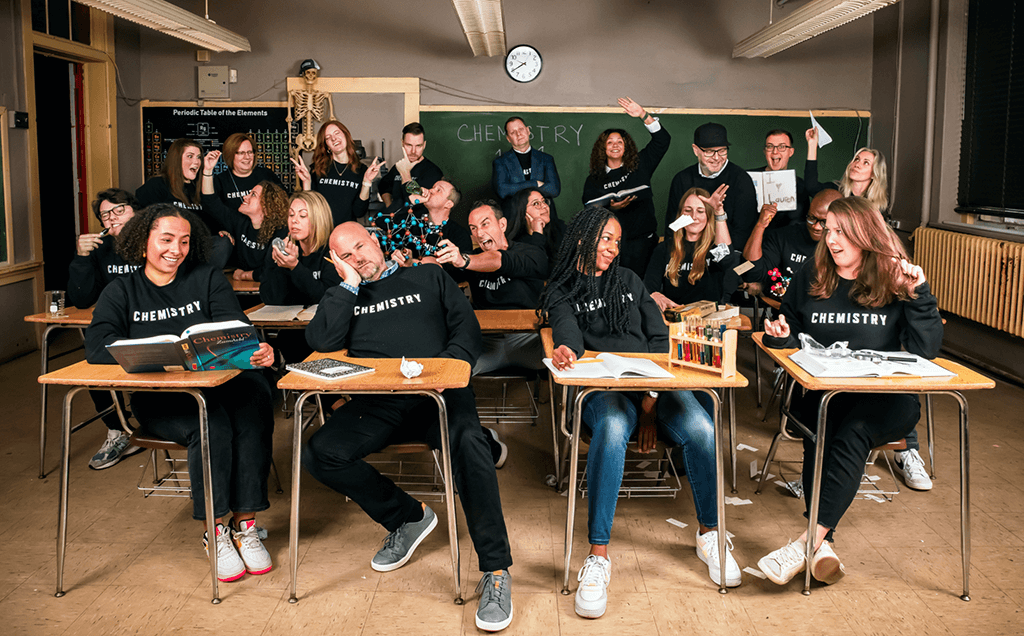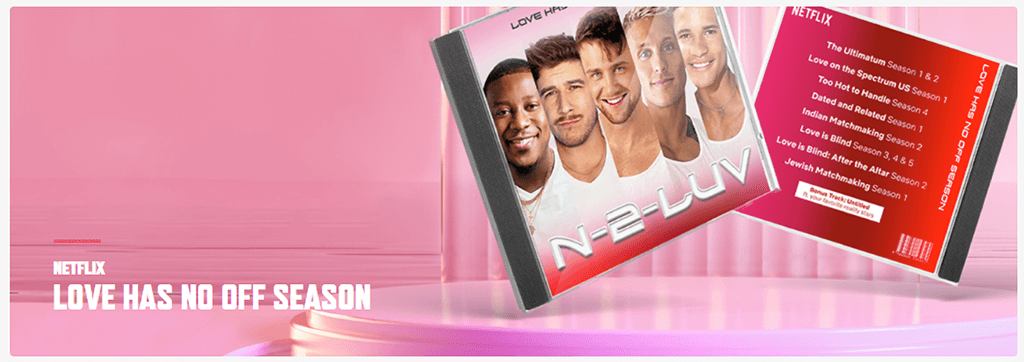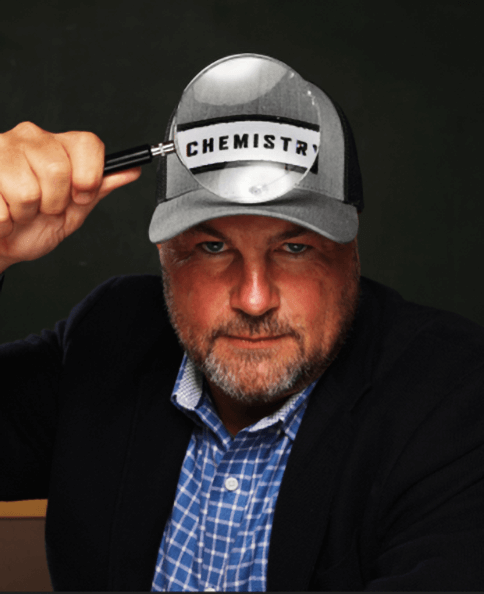By Steve Boehler with special guest Tim Smith
It’s very hard to grow an agency from scratch. Getting the agency’s headcount past 50 takes talent and commitment and very few agencies ever get that large. Breaking 100 seems like an impossible feat and going past 150 – the AdAge definition of “small agency” – takes a herculean effort.
Chemistry has done just that. The agency is approaching 200 staffers with four offices and an amazing client list that includes Netflix, Red Bull, H&R Block, NFL, New York Life, UPS and other impressive partners. And don’t forget the awards, from Clios to Effies to The One Show and Shorty Awards.
What is behind the success at Chemistry? We caught up with cofounder Tim Smith. He describes himself as “a creative thinker, problem solver with an unhealthy obsession for advertising and clients that crave work that can’t be ignored”. Here’s what we heard.
Tim, your agency has an amazing track record of success: 3-time AdAge Small Agency of the Year, Adweek Mid-Sized Agency of the Year Shortlist, 2023 Campaign Agency of the Year Finalist. And now the AdAge A-List! What is it about your agency that has led to all that acclaim?
Tim: We set goals. Crazy goals, but we set them. Lately, we’ve been having to make up new goals. I would be lying if I didn’t say I am amazed myself sometimes. But we knew from the start that having the right people and finding the right clients were going to be the key to everything.
A foundation goal for us was to create a great culture around experimentation. We look for people who inherently question, challenge to the point of making themselves uncomfortable. We preach and celebrate failure because you can’t find new ways to solve problems without going down wrong paths to find new paths. So, it’s not just bringing in folks that are very talented but fit our culture as well. Everyone here has passion, a competitive drive, and a strong distaste for the word “can’t”. To get them, we searched, followed, got lucky, kept our ears to the ground and pounced on opportunities, sometimes creating jobs that didn’t really exist just to get the right people.
We are a creative led agency, and how we evangelize that creativity is not limited to the Creative Department but expected from every person across the agency.

Last week we hit another huge goal with our AdAge A-List recognition that is pushing the limits of our champagne budget, and we again need to raise the bar.
Your website proclaims the following bold notions:
We’re here to blow shit up. So, we experiment with everything. We don’t just throw stuff against the wall to see what sticks. We calculate, measure and test before we throw the right stuff at a very precise piece of wall. Blowing stuff up isn’t arson, it’s architecture. It’s about breaking things so we can put them back together better. It’s about incurring the risk so you’re free to experiment too. Call us pyromaniacs, but we think blowing stuff up together would be a beautiful thing.
But… what if my business is humming and I want to build on that momentum and not blow things up? Not all clients are Michael Bay…
Tim: As you know, clients don’t search for a new agency if they are looking for more of the same. But I will grant you that blowing shit up looks different for every client. For Netflix, every moment is an opportunity to blow shit up. For Children’s Healthcare, it’s about finding a single moment to disrupt in the right way that is true to the brand, but also breaks through in the category. For brands like Five Guys, it’s about tackling those littler problems that might be far away but keep our clients up at night.

Our clients love saying “Blow Shit Up” back to us. But if a business is comfortable with the pace of their trajectory, they don’t need us. We aren’t the right fit for everyone because we believe comfort is a very dangerous thing. We play a lot of offense and if you just want to hold the ball and run out the clock, we are not the team for you. We work well with partners that want to grow faster or in a new way. The key line is it isn’t arson, its architecture. We dissect to learn, then build back better. Most clients come to Chemistry because they need to keep their core customers but grow a new segment of fans. New momentum is impossible to achieve using the definition of insanity – doing the same thing and expecting different results.
What is your agency’s superpower that enables your group to successfully enhance a client’s business?
Tim: I wish I could say our superpower was the ability to fly but we are still working on that one. Our real power comes from our willingness to constantly experiment with everything. We are good with red tape because we aren’t trying to take the easy way out. We’re not afraid to rebuild the engine to fix the car. The days of create and wait are long gone. There is data and learning everywhere. We put things into the world and adjust, put something else out, rework and push our clients until we see great results. So, if we were wearing tights the symbol on our chest would read BSU.
What is the key to connecting with clients and building trust?
Tim: Clients need you to listen, be reliable and transparent.
Listening is a skill that requires focus and active effort. It must be practiced. Giving someone your attention is one of the most important things you can give and it’s rare.
Reliability and transparency go hand in hand. You get hired because the client believes they can consistently rely on you to deliver and over deliver. But pushing expectations and consistency don’t always mingle well.
W&K has a great chart where they show process. It is a line from point A to point B but it’s not a straight line. The line looks like a squiggly ball of yarn from one point to the other. It’s a great snapshot showing that there are always unexpected challenges.
When those challenges arise, you must be transparent and communicate. One of our Chemistry principles is speak human. That sounds simple enough but in an industry that loves to create new vernacular constantly it’s important to not get caught up in the jargon. Simple humanity goes a long way. Make sure the client knows you are on top of every challenge. They will pay you for your talent but keep paying you for their peace of mind. The best relationships have mutual trust, so we expect the same from our clients.
What changes are you seeing in client-agency relationships and what suggestions do you have for the future health of the industry?
Tim: Most businesses have seen immense change and agencies are expected to stay ahead of change. The most disruptive change in relationship building is video conferencing and working from home. Client -Agency relationships are tough to build in an hour with 10 people on video. Arbitrary meetings in hallways and glad to see you hugs don’t happen on zoom. We are experimenting there as well and have had more success meeting at local coffee shops that allow clients to return home after the meeting. We created a speaker series, Off the Rails, and host a music series, So Far Sounds. We use these as incentives for clients to visit our office for a meeting by dangling some entertainment that can’t be experienced over Zoom.
I’m excited about the future. Advertising agencies and brands are impacting culture more than ever. Technology and new channels continue to evolve, grow, and give everyone a voice. But don’t let technology be a substitute for creativity. Today you can’t create the cultural behavior change ideas without social media at the core. That is where the breakthrough that we look for happens. We created a project-based offering called Bomb Squad to really help our clients focus on influencing culture. That group doesn’t start with a traditional brief it starts with what is happening right now in culture looking at new cultural traits, behavior patterns, norms, social structures.
Another good change happening in the industry is the commitment to diversity. There is a lot of industry talk and I hope we will see results. At Chemistry, diversity is not a goal, it’s an essential pillar in our success. We have committed to finding diverse talent in unexpected places and nurturing that talent. That includes experimental custom programs with black businesses and scholarships. We also now have a Hispanic arm – Chemistry Cultura that has been growing rapidly.

Lastly, I hope folks in our industry learn from the past as we embrace the future. There have been amazing people in advertising like Ben Franklin, Toulouse-Lautrec, and P.T Barnum before Bernbach and Ogilvy and amazing agencies that created the foundation of what we do. The advertising good ole days will always look opportunistically favorable, but these are glory days of tomorrow.
If you could go back in time and start Chemistry again, what would you do differently? Would your approach to helping clients succeed be any different based on what you’ve learned over the past few years? Would you change anything about your culture or how you go to market?
Tim: The number one question folks ask when it all comes to an end is “How did I get here?” It all moves fast and while you are planning, navigating, losing, and winning. It’s hard to take it all in. My rule is have fun, it’s the best thing to have.
So, while I should’ve embraced all things digital sooner, focused on social earlier and not told as many people that I thought Google was a stupid name, I am happy we bet the farm on creative thinking. Being young and naïve is a gift and we convinced ourselves that everything would be fine in the left lane – not just 5 miles over the speed limit, but really trying to break the law.
Our approach on helping clients succeed has matured over the years understanding that client’s businesses are moving at break-neck speed and so are their lives. If you believe the goal is to just implement the client request properly you are doing them a disservice. Competitors are going to blow right past them. We always bring more than they ask for and something unexpected with the goal of transforming their business and their lives.
Finally, watching Chemistry culture emanate has been wondrous. Finding talent with the same creative thinking mindset has been key and that ideology has become self-perpetuating as we have grown. There is a lead by action-attitude from all levels and departments. Chemistry goes to Chemistry very transparently. We learned early on that we need clients to understand that at times we will push them to uncomfortable places to grow. Trying to be who you think they want you to be always backfires. You can’t kick ass if you are busy kissing it.

What have you learned about punching above your weight and beating bigger agencies?
Tim: We have learned that anything is possible and it’s a whole lot of fun. We have enjoyed being fiercely independent. Back when we had printed business cards, ours said “There are 4,200 ad agencies in the U.S., we are better than at least half of them”. It was tongue-in-cheek but we knew at the very least we would out work most agencies just because we loved it.
Technology and new channels have allowed independent agencies to compete with the big guys. I’ve worked in the high rises on the blue-chip brands doing the big money high productions. Now we do the same productions daily in our offices and Chemistry is on the same accolade lists as those stalwarts. That feels pretty good. We have smart people with passion. We communicate with intense energy and want it more than the competition.
What client wins have meant the most to you and why?
Tim: It has been rewarding to become friends with people from so many backgrounds through the years. There have been several stages. The first pitch I ever won was at BBDO NY. BBDO put the whole company on the pitch including the juniors like myself. We decided to give the old black and white M&M characters, that used to jump in the chocolate pool, some real personality. It was the biggest win in BBDO history at the time. Seemed easy – I was absolutely clueless.
When I started my agency with Chris Breen, we had no clients, and we pitched a small chain of Irish Pubs. Breen got sick from sucking helium balloons to sound like a leprechaun. That was a huge win because that small retainer put us in business. Then the Atlanta United win came at the perfect time for the agency. I don’t think anyone thought soccer in the South would work. We got the opportunity to create a brand before there were players, coaches or even a stadium. We were able to be a part of creating traditions, rituals, symbols, and behaviors that brought an entirely new culture to the city. We broke every MLS and new sports team franchise attendance record in the books and brands wanted to know who was behind it.
Lately, it has been magical to see the folks here take conservative clients and build and push growing the business and getting the trust to create better and better creative. I still love pitching and we have stuck by our rule to be who we are, not conform to what we think a potential client may want us to be.
What is it about your experience at Chemistry that makes you most proud?
Tim: I am most proud of the culture, which is code for the people I work with at Chemistry. I am amazed that we are reaching our goals under our terms, and we just refuse to be denied. Just as an example, last year we sold a Netflix concept that depended on drawing a crowd. At the last minute the client killed it over Covid concerns. The folks here just didn’t accept it. It was like they didn’t hear the client say “we can’t do this”. The concept was reworked that night using buses to create mobility so big crowds couldn’t gather but we still got the same number of eyeballs and social. Amazing.
But failure is an option here. You can’t have a culture of experimentation if don’t celebrate failure as another way to learn. The leaders of the agency created cultural pillars that define and remind us of who we want to be:
- Progress not Perfection.
- Equity is not an option.
- Speak like a human.
- People over titles.
- Give a damn.
- What’s the best that could happen?

Knowing what you know today, what advice would you give to 30-year-old Tim Smith?
Tim: Less trips to the barber, just enjoy that abundant head of hair.
Also, I was working in one of those big forementioned holding companies. That year, I sold a Visa spot. We shot on Pebble Beach golf course. We went to LA and spent several days with pre-pro at the Four Seasons Beverly Hills as was the norm. Then took a private jet to Pebble Beach. Closed the course for three days, brought in cranes and trucks onto the fairways, shot our spot, played some golf, ate our lobster and mussels at the Lodge Tap Room. Loaded up on bottles of Jack for the jet back, then composed a track with a band in LA. We finished editing over the next week and headed back to NYC. The future looked pretty good since that wasn’t even an extravagant shoot for the globe-trotting Executive Creative Directors. So, when I tell my 30-year-old self to just pass on that future, begin skipping paychecks and start from scratch I am not sure why he would listen. I guess I would say: Trust me, it’s not going to be what you expect. It’s going to be better.
Tim Smith, Chemistry President

As president of Chemistry, Tim Smith oversees the day-to-day operations of the agency across multiple offices. Tim is one of those unique ad minds with passion that steers both agency and client to create the best outcomes possible. This was evident early in his career when Tim’s work as an art director helped BBDO land the Mars/M&M’s account with the creation of the talking M&M’s characters. Over the year’s Tim has created campaigns for amazing global brands in every vertical outside of Automotive. But his true calling is building successful cultures and the ability to galvanize people to create work that can’t be ignored.
Steve Boehler, founder, and partner at Mercer Island Group has led consulting teams on behalf of clients as diverse as Ulta Beauty, Microsoft, UScellular, Nintendo, Kaiser Permanente, Holland America Line, Stop & Shop, Qualcomm, Brooks Running, and numerous others. He founded MIG after serving as a division president in a Fortune 100 when he was only 32. Earlier in his career, Steve cut his teeth with a decade in Brand Management at Procter & Gamble, leading brands like Tide, Pringles, and Jif.
